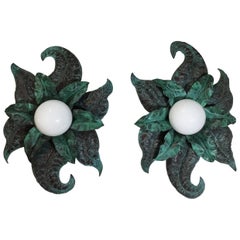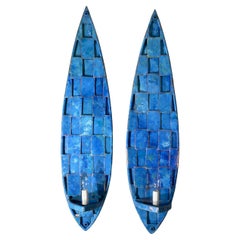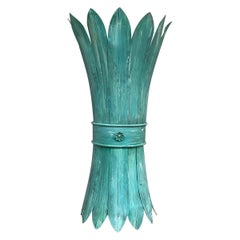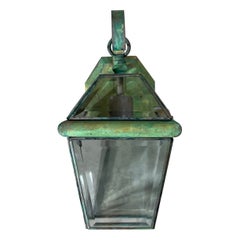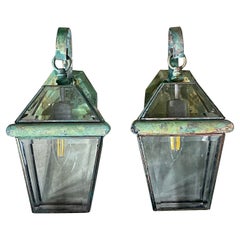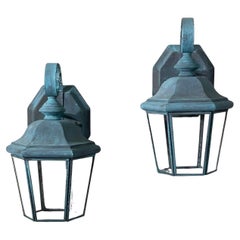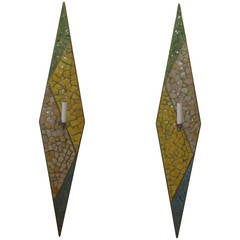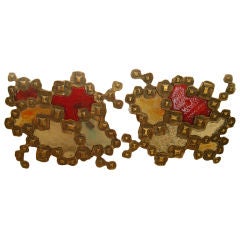Funky Sconce
Vintage 1960s American Wall Lights and Sconces
Copper
21st Century and Contemporary American Wall Lights and Sconces
Copper, Steel
20th Century American Wall Lights and Sconces
Metal
20th Century American Wall Lights and Sconces
Brass
20th Century American Wall Lights and Sconces
Brass
20th Century American Wall Lights and Sconces
Brass
Recent Sales
Vintage 1980s Wall Lights and Sconces
Brass
Vintage 1950s Italian Wall Lights and Sconces
Bronze
Mid-20th Century American Mid-Century Modern Wall Lights and Sconces
Brass
21st Century and Contemporary Unknown Wall Lights and Sconces
Steel
Vintage 1960s American Wall Lights and Sconces
Art Glass, Glass
20th Century American Wall Lights and Sconces
Brass
Mid-20th Century Italian Mid-Century Modern Wall Lights and Sconces
Metal, Enamel
Mid-20th Century German Mid-Century Modern Wall Lights and Sconces
Ceramic
People Also Browsed
21st Century and Contemporary Italian Wall Lights and Sconces
Metal
21st Century and Contemporary Italian Industrial Wall Lights and Sconces
Iron
21st Century and Contemporary Mexican Mid-Century Modern Table Lamps
Wood, Fabric, Linen, Fiberglass
21st Century and Contemporary American Wall Lights and Sconces
Metal, Brass, Nickel
21st Century and Contemporary Swedish Mid-Century Modern Table Lamps
Textile
21st Century and Contemporary British Organic Modern Wall Lights and Sco...
Plaster
21st Century and Contemporary French Brutalist Night Stands
Oak
2010s Italian Mid-Century Modern Wall Lights and Sconces
Brass
2010s Italian Modern Chandeliers and Pendants
Metal, Brass
21st Century and Contemporary Vietnamese Modern End Tables
Wood
Mid-20th Century French Mid-Century Modern Wall Lights and Sconces
Iron
2010s Italian Modern Chandeliers and Pendants
Brass
2010s Italian Side Tables
Onyx
2010s Italian Mid-Century Modern Table Lamps
Brass
2010s Austrian Art Deco Chandeliers and Pendants
Brass
21st Century and Contemporary Swedish Scandinavian Modern Lounge Chairs
Bamboo, Rattan
Funky Sconce For Sale on 1stDibs
How Much is a Funky Sconce?
Finding the Right Sconces-wall-lights for You
From the kitchen to the bedroom and everywhere in between, there is one major part of home decor that you definitely want to master: lighting. Carefully selected vintage sconces and wall lights can do wonders in establishing mood and highlighting your distinctive personality.
We’re a long way from the candelabra-inspired chandeliers of the medieval era. Lighting is no longer merely practical, and lighting designers have been creating and reinventing lighting solutions for eons. Because of the advancements crafted by these venturesome makers, we now have the opportunity to bring unique, customizable lighting solutions into our homes.
It’s never been easier to create dramatic bedrooms, cozy kitchen areas and cheerful bars than it is today. Think of an elegant wall sconce as functional and as a work of art, adding both light and style to your hallways, whimsical kids’ rooms and elsewhere.
When choosing a lighting solution, first determine what your needs are: Will you opt for a moody or a bright feel? The room that will serve as your home office will need adequate lighting — think “the brighter, the better” for this particular setting.
For the bedroom, bedside wall lamps with warm-temperature bulbs instead of bedside table lamps could be the way to go to induce a sense of calm or intimacy. Try to match the style of the wall light or sconce that you’re installing to the overall design scheme of your room. It’s never “just a light.” You should approach the lighting of a room with a mindset that is one part practical and one part aesthetics-driven.
Let 1stDibs help you set the mood with the right antique and vintage wall lights and sconces for your home. Our collection includes every kind of fixture, from sculptural works by Austrian craftsman J.T. Kalmar to chic industrial-style wall sconces, from adjustable painted aluminum wall lamps designed by Artemide to a wide variety of minimalist mid-century modern masterpieces.
Read More
Hans Bergström’s Monumental Chandeliers Are Made for Grand Spaces
Designed by a giant of Swedish lighting, the large-scale fixtures bring major drama.
This Paavo Tynell Chandelier Is a Radiant Bouquet
The alluring pendant light exemplifies the designer’s winsome mid-career work.
Ettore Sottsass Captures a Shooting Star in This Rare 1970s Floor Lamp
Before founding the Memphis Group, Sottsass bent the rules of lighting design with the wonderfully wavy Cometa.
You Don’t Need a Fictional Fairy to Get This Real Pinocchio Lamp
Warm chalet style meets cool Bauhaus functionality in Pietro Cascella’s cleverly carved creation.
Why Is Italy Such a Hotbed of Cool Design?
Patrizio Chiarparini of Brooklyn’s Duplex gallery sheds light on the lasting legacy of Italy’s postwar furniture boom.
With a High-Tech Flagship and Cool Collabs, Lladró Is Breaking the Mold for Porcelain Production
Thanks to its new leadership, the Spanish maker of figurines, busts and lighting is on a mission to update the art of porcelain for the 21st century.
Christopher Tennant’s Lamps and Dioramas Evoke Sunny Days and Seaside Locales
The former magazine editor blends elements of the Far East and America’s eastern shores, bringing wit and delight to his handmade, upcycled designs.
Paavo Tynell’s Snowflake Chandelier Warms Up Any Room
This circa 1950 piece by the legendary Finnish lighting designer spent the past several decades in a family's home in Michigan.
